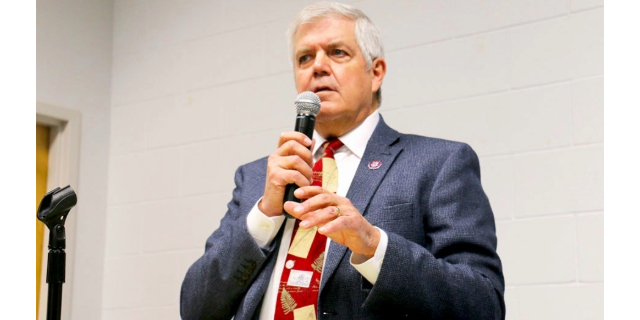Pacific Northwest hasn’t been targeted for ICE raids, but workers say they are scared
Published 8:39 am Thursday, June 26, 2025

- Although producers, processors and industry experts say there haven’t been widespread immigration enforcement operations in the Pacific Northwest, immigrant workers are nonetheless fearful. (Courtesy Immigration and Customs Enforcement)
Farmers, processors and industry experts say that while there haven’t been U.S. Immigration Customs and Enforcement raids or sweeps at farms, packing houses and processing facilities in the Pacific Northwest, many immigrant workers are afraid.
Even while advocating mass deportation of illegal immigrants, President Trump has suggested that he would support a program that would grant legal status to farmworkers under certain conditions. Earlier this month, he said on social media that he expected to issue an order to ICE regarding immigration enforcement actions against farmworkers.
The administration has yet to propose a plan for exempting farmworkers from immigration enforcement, or clearly said it won’t conduct random raids on farms.
Save Family Farming, an advocacy organization, issued a press release drawing attention to the possibility that a labor shortage will develop. Contradictory statements from the Trump administration won’t help, said Ben Tindall, executive director of Save Family Farming.
“The administration and Congress must sit down with farmworker advocates and agricultural leaders to craft immigration policies that actually protect the people and communities feeding this country,” he said.
Jon DeVaney, Washington State Tree Fruit Association president, said reports of federal agents nearby, whether true or not, have caused disruptions for some agricultural operations.
“I have heard reports of ICE arriving at farms or processing facilities looking to carry out warrants for specific individuals, but not broader raids here in Washington,” DeVaney wrote in an email.
Idaho Dairymen’s Association CEO Rick Naerebout said immigration enforcement raids have not been seen in the industry in the state but have occurred elsewhere, such as at Outlook Dairy Farms in New Mexico early this month.
“We know enforcement actions are happening in other states,” he said. “We’re fortunate it hasn’t happened here, so the concern is merited. There are more unknowns than knowns at this point.”
Jennifer Uranga owns Mountain West Ag Consulting, a southwest Idaho business that specializes in federal H-2A guest worker applications and in farm human resource needs.
“I think there have been cases where the workers have been staying away when they heard there are rumors of ICE enforcement” in Idaho, Washington and Oregon, she said.
Cherry pickers needed
With a bumper cherry crop, Northwest producers say they are facing a shortage of pickers this season. It’s unclear, however, how much the potential for enforcement actions is contributing to the shortage.
“The shortage is worse than I would expect in a big crop. Growers are having trouble meeting their usual number of people picking,” said Mike Omeg, director of operations for Orchard View Farms, headquartered in The Dalles, Ore.
“To make the shortage worse we have a big crop of cherries this year,” he said in a text message exchange.
Lesley Tamura, Columbia Gorge Fruit Growers board chairwoman and a pear farmer, said Hood River, Ore., was included in the U.S. Department of Homeland Security’s list of Oregon sanctuary jurisdictions and that’s making workers especially nervous.
“Cherry growers in harvest right now are short in their labor force because so many people are terrified of coming up from California, so our growers and employees are definitely feeling the impact,” Tamura said in an email.
Tamura wasn’t sure if there’s an ICE presence in the area or if there are simply rumors stemming from fear and panic.
Carlos Torres, owner of PLM Orchards in Wenatchee, Wash., grows cherries, apples and pears, and he’s facing a shortage of workers, so employees he has are working as late as they can every day.
“We all, here in the valley, are down on workers,” Torres said.
He expects the shortage to continue throughout the late summer and into fall during the harvest for apples and pears.
Torres said big growers are increasing wages to get more help, so smaller growers with fewer resources will face tougher times.
Charlie Lyall, who grows cherries, apples and concord grapes, said he was almost finished with cherry picking and faced a labor shortage.
“A lot of the California guys, and probably from other states, they were late coming up, and I don’t think some of them came up,” said Lyall, owner of Lyall Farms headquartered in Mattawa, Wash.
“Once you get behind, you just can’t catch up. We’re going into thinning for apples. I’m expecting a tough time getting enough workers,” he said.
No impact on processing
ICE reported detaining more than 70 illegal aliens at a meat-packing plant in Omaha, Neb. They used stolen Social Security numbers to get jobs, according to ICE.
There have been no reports of raids in Northwestern processing plants.
“Outside of what’s been on broadcast media, I haven’t heard anything from any of my members or from anything that’s occurred in the Columbia Basin or Central Washington,” said Jack Field, executive director of the Washington Cattle Feeders Association. “Thus far, I haven’t had any reports from feedyards having any issues. It sounds like so far, everything’s been business as usual.”
Jacki Madill, executive director of the Washington Beef Commission, agreed.
“Both of our major packers have not expressed any concerns,” Madill said.
Fear is real
“We had one case last week where one worker did not want to work in a field harvesting because they saw a truck they thought was an ICE truck — it wasn’t,” Alan Schreiber, executive director of Washington Blueberry Commission, said in an email.
Natalie Collins, California Association of Winegrape Growers president, said there was a lot of general unease in agricultural communities.
The association is ensuring that growers have the most up-to-date information on enforcement actions and that each member knows what to do if ICE enters their property.
“We also want to ensure that our workforce knows their rights, and that we are actively communicating with them,” she said, in an email.
Snake River Sugarbeet Growers Association executive director Samantha Parrott said the issue highlights a broader concern.
“Agriculture across the country relies heavily on a workforce that’s estimated to be 50% undocumented,” Parrott said. “If that workforce disappears, how will we continue to produce food? Food security is national security and we need real solutions that recognize the realities of labor in agriculture.”
Capital Press reporters Don Jenkins, Kyle Odegard, Matthew Weaver and Brad Carlson contributed to this report.






